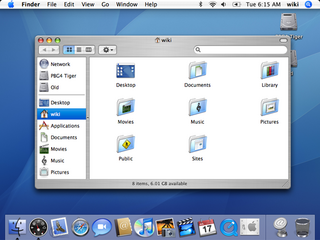Samba is a free software re-implementation of the SMB networking protocol, and was originally developed by Andrew Tridgell. Samba provides file and print services for various Microsoft Windows clients and can integrate with a Microsoft Windows Server domain, either as a Domain Controller (DC) or as a domain member. As of version 4, it supports Active Directory and Microsoft Windows NT domains.

macOS Server, formerly named Mac OS X Server and OS X Server, is a discontinued, stand-alone server operating system by Apple Inc.. It is also the name of its replacement software, an operating system addition, for macOS that provides additional server programs along with management and administration tools for iOS and macOS.
In computing, directory service or name service maps the names of network resources to their respective network addresses. It is a shared information infrastructure for locating, managing, administering and organizing everyday items and network resources, which can include volumes, folders, files, printers, users, groups, devices, telephone numbers and other objects. A directory service is a critical component of a network operating system. A directory server or name server is a server which provides such a service. Each resource on the network is considered an object by the directory server. Information about a particular resource is stored as a collection of attributes associated with that resource or object.

Sherlock, named after Sherlock Holmes, was a file and web search tool created by Apple Inc. for the PowerPC-based "classic" Mac OS, introduced with Mac OS 8 as an extension of the Mac OS Finder's file searching capabilities. Like its predecessor, Sherlock searched for local files and file contents, using the same basic indexing code and search logic found in AppleSearch. Sherlock extended the system by enabling the user to search for items through the World Wide Web through a set of plugins which employed existing web search engines. These plugins were written as plain text files, so that it was a simple task for a user to write a Sherlock plugin.

In computing, rmdir is a command which will remove an empty directory on various operating systems.
Microsoft Exchange Server is a mail server and calendaring server developed by Microsoft. It runs exclusively on Windows Server operating systems.
The Apple Filing Protocol (AFP), formerly AppleTalk Filing Protocol, is a proprietary network protocol, and part of the Apple File Service (AFS), that offers file services for macOS and the classic Mac OS. In macOS, AFP is one of several file services supported, with others including Server Message Block (SMB), Network File System (NFS), File Transfer Protocol (FTP), and WebDAV. AFP currently supports Unicode file names, POSIX and access control list permissions, resource forks, named extended attributes, and advanced file locking. In Mac OS 9 and earlier, AFP was the primary protocol for file services.

Mac OS X Tiger is the fifth major release of Mac OS X, Apple's desktop and server operating system for Mac computers. Tiger was released to the public on April 29, 2005 for US$129.95 as the successor to Mac OS X 10.3 Panther. Some of the new features included a fast searching system called Spotlight, a new version of the Safari web browser, Dashboard, a new 'Unified' theme, and improved support for 64-bit addressing on Power Mac G5s. Mac OS X 10.4 Tiger offered a number of features, such as fast file searching and improved graphics processing, that Microsoft had spent several years struggling to add to Windows with acceptable performance.
9P is a network protocol developed for the Plan 9 from Bell Labs distributed operating system as the means of connecting the components of a Plan 9 system. Files are key objects in Plan 9. They represent windows, network connections, processes, and almost anything else available in the operating system.
HFS Plus or HFS+ is a journaling file system developed by Apple Inc. It replaced the Hierarchical File System (HFS) as the primary file system of Apple computers with the 1998 release of Mac OS 8.1. HFS+ continued as the primary Mac OS X file system until it was itself replaced with the release of the Apple File System (APFS) with macOS High Sierra in 2017. HFS+ is also one of the formats used by the iPod digital music player. It is also referred to as Mac OS Extended or HFS Extended, where its predecessor, HFS, is also referred to as Mac OS Standard or HFS Standard. During development, Apple referred to this file system with the code name Sequoia.
launchd is an init and operating system service management daemon created by Apple Inc. as part of macOS to replace its BSD-style init and SystemStarter. There have been efforts to port launchd to FreeBSD and derived systems.
Distributed File System (DFS) is a set of client and server services that allow an organization using Microsoft Windows servers to organize many distributed SMB file shares into a distributed file system. DFS has two components to its service: Location transparency and Redundancy. Together, these components improve data availability in the case of failure or heavy load by allowing shares in multiple different locations to be logically grouped under one folder, the "DFS root".

Keychain is the password management system in macOS, developed by Apple. It was introduced with Mac OS 8.6, and has been included in all subsequent versions of the operating system, now known as macOS. A Keychain can contain various types of data: passwords, private keys, certificates, and secure notes.
Apple Open Directory is the LDAP directory service model implementation from Apple Inc. A directory service is software which stores and organizes information about a computer network's users and network resources and which allows network administrators to manage users' access to the resources.
The following tables compare general and technical information for a number of file systems.

Time Machine is a backup software application distributed as part of macOS, desktop operating system developed by Apple. The software is designed to work with AirPort Time Capsule, the Wi-Fi router with built-in hard disk, as well as other internal and external disk drives. It was introduced in Mac OS X Leopard.
Jive is a commercial Java EE-based Enterprise 2.0 collaboration and knowledge management tool produced by Jive Software. It was first released as "Clearspace" in 2006, then renamed SBS in March 2009, then renamed "Jive Engage" in 2011, and renamed simply to "Jive" in 2012.
Apple certification programs are IT professional certifications for Apple Inc. products. They are designed to create a high level of technical proficiency among Macintosh service technicians, help desk support, technical support, system administrators, and professional users. Apple certification exams are offered at Prometric testing centers and Apple Authorized Training Centers, as well as online through Pearson Vue.

Xgrid is a proprietary program and distributed computing protocol developed by the Advanced Computation Group subdivision of Apple Inc that allows networked computers to contribute to a single task.

GroupWise is a messaging and collaboration platform from Micro Focus that supports email, calendaring, personal information management, instant messaging, and document management. The GroupWise platform consists of desktop client software, which is available for Windows, Mac OS X, and Linux, and the server software, which is supported on Windows Server and Linux.






